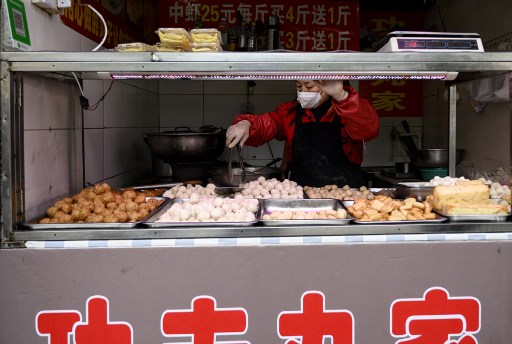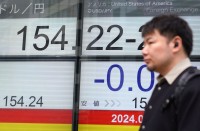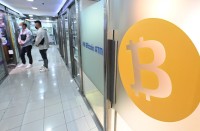
HONG KONG, China (AFP) — Asian markets fell on Thursday after a dramatic spike in the number of coronavirus deaths and cases in mainland China, with traders concerned about the economic impact of the epidemic.
Chinese authorities have changed the way they count infections from the virus — officially named COVID-19 — and the latest reports propelled the nationwide death toll to 1,355 and the infection count to nearly 60,000.
Tokyo’s benchmark Nikkei 225 index closed 0.1 percent down, while Shanghai ended the day 0.7 percent lower.
Elsewhere in afternoon trade, Hong Kong dipped 0.2 percent, Seoul dropped 0.2 percent, and Singapore lost 0.3 percent.
Sydney and Taipei, however, were higher.
The new virus numbers dampened the positive cue from Wall Street overnight, where the three main indexes all set fresh records.
Traders in Europe were also in a positive mood on Wednesday, with Frankfurt hitting a record close and Paris ending at its highest level this year.
The jump in China coronavirus numbers “has initially hit like a ton of bricks given this is one of the market’s biggest fears”, Stephen Innes, chief market strategist at AxiCorp, wrote.
But he added that despite the “gnarly” headlines, the rise could be the result of a testing backlog being cleared over the weekend in Hubei province, where the virus emerged late last year.
– Markets ‘jolted’ –
China has been praised by the World Health Organization (WHO) for its transparent handling of the outbreak.
There is, however, still scepticism among the global public, with suggestions that Beijing may be concealing the scale of the problem the way it did during the 2002-2003 SARS epidemic.
“Just when markets were getting comfortable with the idea that the COVID-19 infection increase was trending lower, the sudden jump in the number of new cases in Hubei has jolted them out of this sense of complacency,” Khoon Goh, head of Asia research at Australia & New Zealand Banking Group, told Bloomberg News.
COVID-19 has threatened to harm the Chinese economy, the world’s second-largest, with ANZ bank warning that China’s first-quarter GDP growth would slow to 3.2-4.0 percent, down from a previous projection of 5.0 percent.
In a Wednesday meeting, China’s top leadership called for efforts to minimise the impact of the outbreak and pledged measures to help firms deal with the economic fallout.
A day later, the ruling Communist Party fired two top-ranking officials in Hubei.
China is the world’s biggest importer and consumer of oil, and crude prices have been particularly sensitive to the epidemic.
The fresh jitters hit both main contracts on Thursday, which dropped after rising mid-week.
Brent Crude was down 0.3 percent and West Texas Intermediate was 0.1 percent lower.
– Key figures at 0710 GMT –
Tokyo – Nikkei 225: DOWN 0.1 percent at 23,827.73 (close)
Hong Kong – Hang Seng: DOWN 0.2 percent at 27,758.99
Shanghai – Composite: DOWN 0.7 percent at 2,906.07 (close)
Euro/dollar: UP at $1.0874 from $1.0869
Pound/dollar: DOWN at $1.2952 from $1.2960
Euro/pound: UP at 83.95 pence from 83.87 pence
Dollar/yen: DOWN at 109.78 from 109.92
Brent Crude: DOWN 0.3 percent at $55.62 per barrel
West Texas Intermediate: DOWN 0.1 percent at $51.13 per barrel
New York – S&P 500: UP 0.7 percent at 3,379.45 (close)
New York – Nasdaq: UP 0.9 percent at 9,725.96 (close)
New York – Dow: UP 0.9 percent at 29,551.42 (close)
London – FTSE 100: UP 0.5 percent at 7,534.37 points (close)
— Bloomberg News contributed to this story —
© Agence France-Presse







